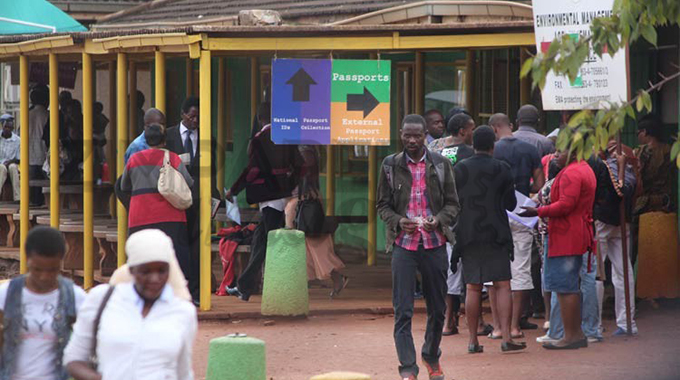We need to avoid another brain drain

Leroy Dzenga Features Writer
Long queues at the Passport Office represent a scary prospect. Daily, thousands of young people are waiting in line trying to get their hands on the coveted travel document.
Some of the passport seekers say the end game is travelling to other countries to “try out new things.”
It might not seem apparent at the moment, but it appears another brain drain is looming as young professionals explore greener pastures.
It would be tragic if the country begins to lose young professionals, especially those who had already been absorbed into the job market or those who had set up businesses.
This will translate into a multi-layered loss for the country and calls for introspection.
Around 2008, the same happened and Zimbabwe lost some of its best brains, the same cannot be allowed to happen again.
But to avoid history from repeating itself, tough questions need to be asked and answered.
Are the prevailing conditions fit for youth-run businesses and those who are employed? Every country seeking recovery needs a fair dose of innovation and experience.
This can be found in young professionals who have spent a few years in critical industries, but still yearn to see a change in the way some things work.
While experience held by elders who have been in trades for a long time is invaluable, the country may benefit from the youthful curiosity of its fresh talent.
It is difficult to keep young ambitious minds in the country when they are not appreciated.
Of course, there are times when the exuberance of youth gets the better of them and make outrageous demands.
Like junior doctors when they wanted their salaries indexed to the United States dollars when Government had made it clear it cannot afford to meet such.
Lives were unfortunately lost and it is a relief to hear they are returning to work.
Maybe if the negotiations had taken a middle of the road approach, all what patients in the country went through could have been avoided.
That debacle should be a lesson to employers and youthful employees alike.
Conditions of work in Zimbabwe are not going to be the same as during the multi currency era, as the country seeks to correct economic fundamentals.
But this curing process means everyone has to come to the table ready to compromise, country duty requires all to do the same.
Companies, although not paying people the US dollar equivalent they used to pay, should strive to ensure they make financial sense for people to remain employees.
For every graduate who leaves the country, there is a return on investment which the country would have to forgo.
The greater percentage of students in Zimbabwe are products of State universities.
At these institutions, tuition is subsidised, which means the taxpayers shoulder part of the burden in educating the 20 000 plus learners the country produces annually.
Presently, university fees were capped at $5 000, this is close to US$250, almost half of the tuition which was being paid two years ago.
Costs have not lost value in equal measure, which means the taxpayer will play a bigger role in ensuring the country has graduates at the end of this year and a few more to come.
It would be a betrayal to the investment if graduates leave for the airport first thing after being capped, equipped with a degree which was in-part publicly funded.
There is need for the operating environment in Zimbabwe to be conducive for youths.
Government, through the Ministry of Youth, Sport, Arts and Recreation should take time to understand needs of the young and work to ensure they are met in a reasonable way.
Sometime last year, time and resources were poured into the hosting of the National Youth Indaba.
Resolutions were passed and sounded promising, however, there has been little movement.
Were the youth aspirations in the country shelved?
A lot of youthful Zimbabweans are patriotic, but there has to be effort to ensure they do not become disadvantaged by their love of country.
The public and private sector in direct contact with youths through employment should make sure they try their best to maintain the talent they are in contact with.
Even at household level, supporting youth-led businesses could be playing a part in avoiding the much dreaded brain drain.
At the end of the day, it has to make sense for young people to remain in the country and play their key roles as Zimbabwe works to rediscover her mighty again.









Comments